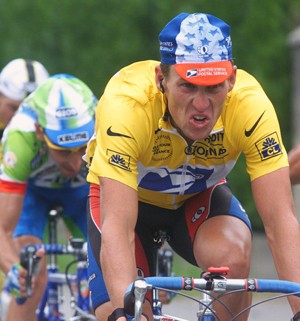
Here’s what I grant is a minority view on the Lance Armstrong matter, and please pardon my language:
If self-righteousness were bullshit (which, in large measure, it is) enough of it has been dumped on the matter of Lance Armstrong as to require an infinite number of shovels to deal with it and an almost unimaginable amount of disinfectant.
It is said that cyclist Armstrong “cheated” in his seven consecutive Tour de France victories by using such performance-enhancing additives as EPO, testosterone, cortisone, and steroids. This is a bit like contending that Such-and-Such a show-biz celebrity had “cheated” on a spouse. Granted, marriage for most people remains a monogamous sacrament (though such unions are increasingly more serial than otherwise), but it’s no secret that the doctrine of Open Marriage, which enjoyed a serious and respectable vogue in society at large not too long ago, has long been something of a norm among movie folks and suchlike.
In other words, it’s not “cheating” if what you’re doing is in conformity with the rules of the prevailing culture. To be sure, not every cyclist used drugs, but all the competitive ones seem to have, and it’s unfair and unreasonable to suggest that their use was the only, or even the main, reason for Armstrong’s standing above the field.
On what he described to Oprah Winfrey as a “level playing field,” Armstrong was certifiably the best of the best. It almost stands to reason that, if drugs could really have been kept out of racing, he still would have been so.
Okay, so Lance could play rough with members of his team or entourage —technical offenders themselves, it would seem — who threatened to expose his practices or who actually did so, thereby —what? —putting his career and reputation in jeopardy. Well, duh! At most, that’s what he’s accused of doing to them, reactively.
On the score of performance-enhancing additives, btw: What is the morning cup of coffee, if not that? What are one-a-day multiple vitamin capsules, if not that? How many of us, day in and day out, are in constant pursuit of, and consumption of, what amount to P.E.D.’s? They’re perfectly legal, for the most part, but much of what we ingest in the pursuit of self-improvement may be injurious to our health, as Armstrong’s P.E.D’s almost certainly are. Self-dosing is not quite a victimless crime; it’s just that the potential victim is oneself.
Beyond all of this, the main reason why all of the posturing and finger-pointing and scapegoating of Lance Armstrong is wrong-headed stems from what his doctor had to say about it.
I don’t mean any of the doctors who enabled his use of performance enhancers. I mean the physician who treated Armstrong for cancer in the mid-‘90s.
This is Dr. Lawrence Einhorn of Indianapolis, who helped save the life of Armstrong when the cyclist was suffering from a virulent, metastasizing third-stage cancer. It was Armstrong’s seemingly miraculous recovery that made him such an iconic figure to so many millions of people worldwide, very few of whom had paid the slightest attention to the sport of cycling then. Nor do so now.
From USA Today last week:
“Virtually 100 percent of my cancer patients all feel that (Armstrong) has done far more good than any damage he’s done,” said Einhorn, who works at the Melvin and Bren Simon Cancer Center in Indianapolis.
Let him tell you about the mixed bag that will always be Lance Armstrong; a quandary perhaps only fully understand by those who have faced cancer. If a man helps them endure some of the darkest days of their lives, they won’t turn on him because of how he won a bicycle race.
“If he didn’t do doping, he would not have been competitive in his sport,” Einhorn said. “There would have been no foundation. There would have been no cancer survivorship talk, if he had not entered the Tour de France, or (if he had) finished 17th or 18th. It doesn’t mean that the ends justify the means.”
But it’s a dilemma?
“Exactly. I’ve always told (Armstrong) for many, many years that his legacy is going to be his legacy as a cancer survivor and what he’s meant to the cancer community.”
Last week when I was in Washington for the Inaugural of President Obama, I stopped by the office of 9th District congressman Steve Cohen. While there I had a lengthy and informative chat with Beanie Self, one of the congressman’s ultra-helpful aides.
Beanie is a cancer survivor, one who still requires ameliorative medical treatment several years after being originally treated for breast cancer. Independently of the remarks of Dr. Einhorn, which she hadn’t known about, she proclaimed continued admiration for Armstrong’s work with the Livestrong organization, a creation of his which has raised both world-wide consciousness and enormous funding to combat cancer.
More than that, as Beanie pointed out, Armstrong’s own example will continue to inspire victims of the disease. He will inspire them for the simple reason of his survival. His phenomenal successes as an athlete are the cherry on top. Besides being a champion, might he also have been something of a rascal, a rogue — even, as so many are insisting, a villain?
Eureka!, the cancer survivor might respond. That he survived to become any or all of those things, that he survived, for better or for worse, to win races, to kick asses or take names, to cut corners or race up mountains, is a miracle. All the more so for manifestly remaining a human like the rest of us, a fully rounded character, with vices and virtues alike.
Dr. Einhorn is right about Lance Armstrong, not his ultra-vilifiers, who are doing their own riding on an easy but low road. And indulging in their own kind of cheating.